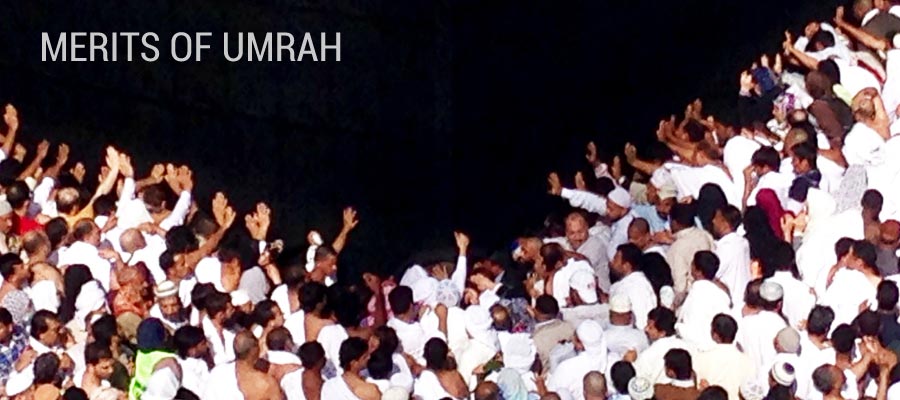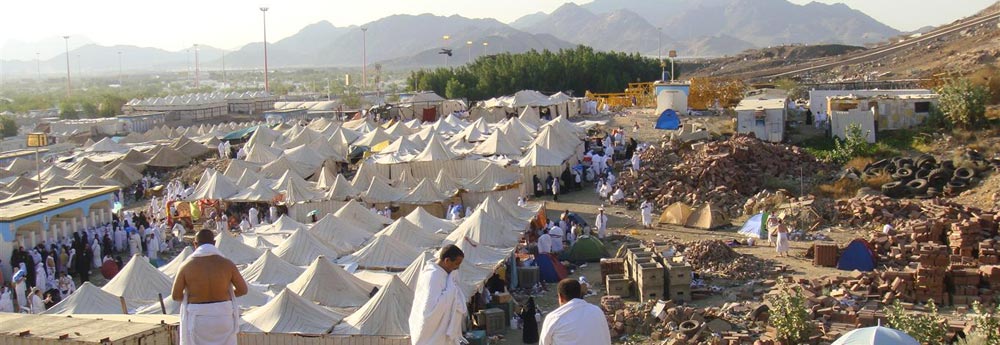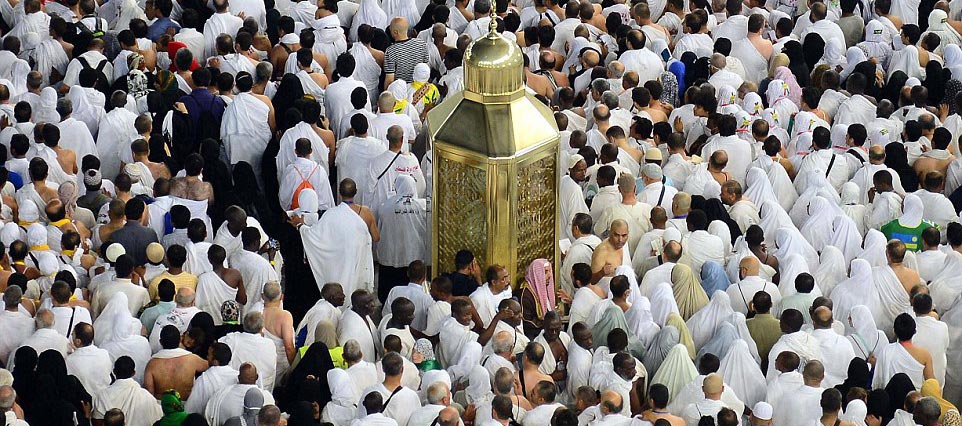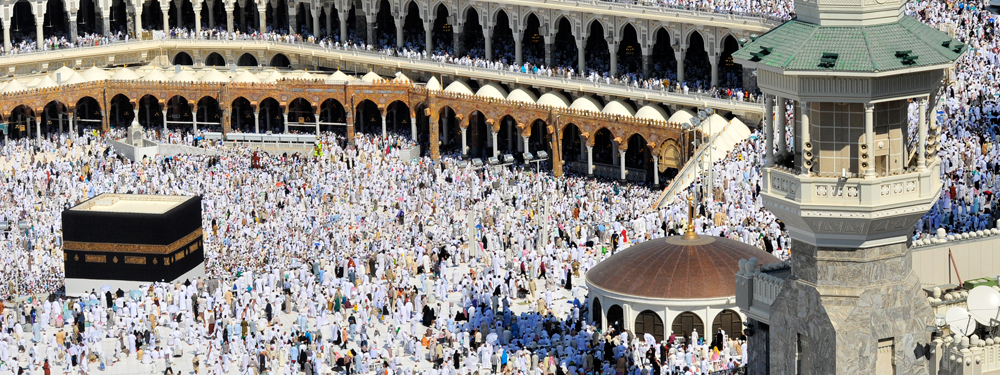Source:islamicity.org
What are the blessings of Hajj? One may describe them in great detail. But, in the Qur’an, where Allah instructs Ibrahim to invite people to come to Hajj, it is said:
So that they may witness things that are of benefit to them… Al-Hajj 22:28.
Hence, the real blessings of Hajj can only be experienced by those who actually perform it. Imam Abu Hanifah, it is narrated, was unsure which act of worship was more excellent among the various ones laid down by Islam. But once he had performed Hajj, he had no hesitation in declaring that Hajj was the most excellent of all.
The Journey
We usually think of journeys as of two kinds: those made for business and those made for pleasure. In both cases, it is to fulfill your worldly desires and benefit yourselves that you leave your homes, separate from families, spend money-all is done for your own sake. No question arises of sacrifice for any higher, sublime purpose.
But the journey that is the Hajj is quite different in nature. This is not meant for any personal end. It is undertaken solely for Allah and the fulfillment of the duty prescribed by Allah. Nobody can be prepared to undertake this journey until and unless he has love of Allah in his heart, as well as fear of Him, and is convinced that Allah wants him to do what he is doing. That you are willing to bear the privations arising from separation from your family, to incur great expenses on a journey that will bring no material rewards, and to suffer any loss of business or job, all are signs of certain inner qualities: that you love and fear Allah more than anything, that you have a strong sense of duty to Him, that you are willing to respond to His summons and ready to sacrifice your material comforts in His cause.
Virtue and Piety
The closer you get to the House of Allah, the more intense becomes your desire to do good.
You will find that your love of Allah heightens as you start preparing for your pilgrimage journey with the sole intention of pleasing Allah. With your heart longing to reach your goal, you become purer in thought and deed. You repent for past sins, seek forgiveness from people whom you might have wronged, and try to render your due to others where necessary so as not to go to Allah’s court burdened with injustices that you may have done to your fellow beings. In general, the inclination to do good intensifies and abhorrence of doing evil increases.
After leaving home, the closer you get to the House of Allah, the more intense becomes your desire to do good. You become careful so that you harm nobody while you try to render whatever service or help you can to others. You avoid abuse, indecency, dishonesty, squabbles, and bickering because you are proceeding on the path of Allah. Thus your entire journey constitutes an act of worship. How, then, can you do wrong? This journey, in contrast to every other, is a continuing course through which a Muslim attains a progressive purification of the self. On this journey, then, you are pilgrims to Allah.
The Impact of Hajj
It is now easy to see that for two or three months, from the time of deciding and preparing for Hajj to the time of returning home, a tremendous impact is made on the hearts and minds of pilgrims. This process entails sacrifice of time, sacrifice of money, sacrifice of comfort, and sacrifice of many physical desires and pleasures- and all this simply for the sake of Allah, with no worldly or selfish motive.
Together with a life of sustained piety and virtuousness, the constant remembrance of Allah and the longing and love for Him in the pilgrim leave a mark on his heart which lasts for years. The pilgrim witnesses at every step the imprints left by those who sacrificed everything of theirs in submission and obedience to Allah. They fought against the whole world, suffered hardships and tortures, were condemned to banishment, but ultimately did make the word of Allah supreme and did subdue the false powers that wanted a man to submit to entities other than Allah.
Hajj constitutes preparation for the great task, which Islam wants Muslims to do.
The lesson in courage and determination, the impetus to strive in the way of Allah, which a devotee of Allah can draw from these clear signs and inspiring examples, can hardly be available from any other source. The attachment developed with the focal point of his religion by walking around the Kaaba (Tawaf), and the training received to live a mujahid’s life through the rites of Hajj (such as running from place to place and repeated departures and halts) are great blessings indeed.
Combined with the Prayer, fasting, and almsgiving (zakah), and looked at as a whole, you will see that Hajj constitutes preparation for the great task, which Islam wants Muslims to do. This is why it has been made compulsory for all who have the money and the physical fitness for the journey to the Ka`bah. This ensures that, in every age, there are Muslims who have passed through this training.
Hajj: A Collective Worship
The great blessings of spiritual and moral regeneration, which Hajj imparts to each person, are before you. But you cannot fully appreciate the blessings of Hajj unless you keep in view the fact that Muslims do not perform it individually: hundreds of thousands perform it communally during the time fixed for it. At one stroke Islam achieves not one or two but a thousand purposes.
The advantages of performing the Prayer singly are by no means small, but by making it conditional with the congregation and by laying down the rule of Imamah (leadership in the Prayer) and by gathering huge congregations for the Friday and `Eid Prayers, its benefits have been increased many times. The observance of the fasting individually is no doubt a major source of moral and spiritual training, but by prescribing that all Muslims must fast in the month of Ramadan those benefits have been greatly increased. The almsgiving, too, has many advantages even if dispensed individually, but with the establishment of a centralized Bayt al-mal (Treasury of the Islamic state) for its collection and disbursement, its usefulness is increased beyond measure.
The same is true of Hajj. If everyone were to perform it singly, the effect on individual lives would still be great. But making it a collective act enhances its effectiveness to a point, which gives it a new dimension altogether.
Umrah Packages | Hajj Packages | Ramadan Umrah Packages | December Umrah Packages
Source: islamicity.org



